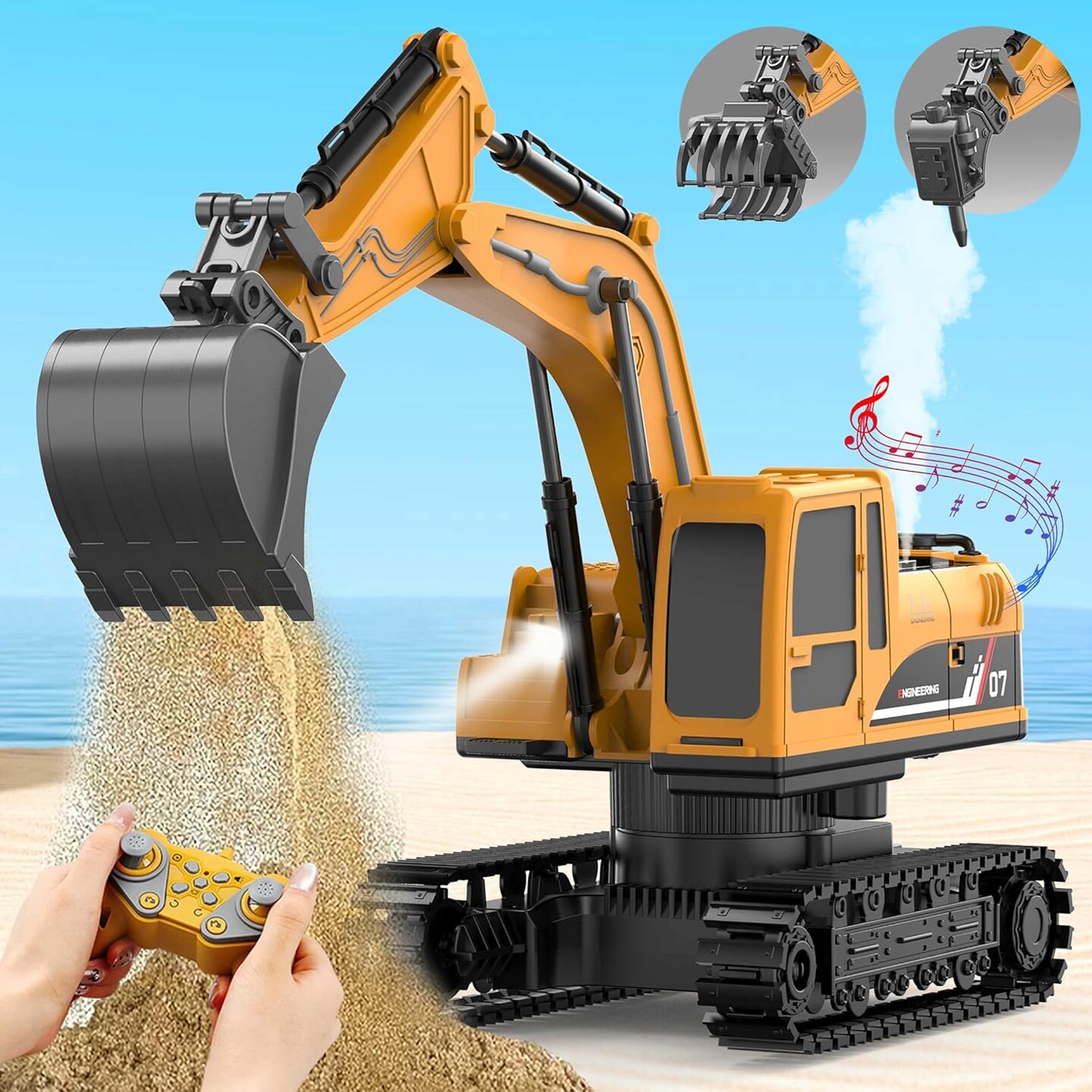How to Improve Productivity with a rc excavator on Your Next Project
Discover the Importance of Excavator in Modern Building And Construction Projects
Excavators are important tools in contemporary building tasks. Their versatility enables them to do a variety of tasks, from digging and grading to demolition and site prep work. Advanced features, such as hydraulic attachments and GPS, boost their capabilities and effectiveness on work websites. As the industry develops, the value of excavators grows much more. Recognizing their function can disclose insights into the future of construction techniques. What lies in advance for these devices?
The Convenience of Excavators in Different Projects
Although excavators are often connected with large building and construction jobs, their versatility permits them to be used in a large range of applications, from residential landscaping to utility maintenance. In urban setups, excavators can navigate limited rooms to dig structures for homes or install water drainage systems. Their capacity to perform fragile jobs makes them ideal for landscape design jobs, where they can dig deep into for ponds or plant trees. Additionally, excavators play a crucial function in energy upkeep, efficiently digging trenches for pipes or wires without disrupting bordering areas. In farming applications, they help in land clearing and dirt preparation. Furthermore, their adaptability enables them to be geared up with various add-ons, enhancing their functionality throughout different tasks. This diverse nature of excavators not only improves numerous construction processes but likewise shows their important role in contemporary facilities growth and maintenance.
Trick Features and Sorts Of Excavators
The conversation on essential attributes and types of excavators highlights the essential features that make these devices indispensable in building. Different excavator kinds, each developed for certain jobs, show their flexibility and performance throughout various applications. rc excavator. Comprehending these classifications and functions is essential for optimizing their use in modern construction jobs
Excavator Keys In Summary
Excavators play a pivotal duty in modern-day building and construction, supplying convenience and performance throughout various tasks. These heavy machinery systems can be found in several types, each customized for certain applications. One of the most usual kinds consist of crawler excavators, understood for their stability on uneven terrain, and rolled excavators, which give better movement on smooth surface areas. Miniature excavators are preferred for limited spaces and small tasks, while long-reach excavators are made for deep excavating. Furthermore, there are specific excavators, such as hydraulic excavators, which enhance power and accuracy. Each kind features distinct capacities, making them important for tasks ranging from excavating and grading to demolition and product handling. Comprehending these variations permits building and construction specialists to select the best excavator for their project requires.
Trick Includes Explained
Comprehending the key functions of excavators boosts their reliable application in construction tasks. Excavators are defined by their powerful hydraulic systems, which give the essential pressure for digging, training, and moving materials. Their verbalized arms enable a vast array of movement, assisting in precise operations in confined rooms. In addition, the range of attachments, such as pails, grapples, and augers, increases their flexibility to meet various job requirements. The dimension and weight of excavators additionally add to their stability and ability to move on numerous surfaces. Improvements in technology have led to the assimilation of General practitioner and automation, improving precision and effectiveness in excavation jobs. These attributes collectively position excavators as important tools in modern-day building and construction.
Applications in Construction
Transforming building and construction sites, excavators play a crucial role across numerous applications, ranging from domestic building projects to massive framework developments. These functional equipments are outfitted for jobs such as digging structures, trenching for utilities, and website grading. Different sorts of excavators, consisting of spider, rolled, and mini excavators, provide certain benefits customized to the task demands. Spider excavators excel in rough terrains, while wheeled excavators use mobility on paved surfaces. Miniature excavators are suitable for constrained rooms, making them preferred in city setups. The efficiency and power of excavators significantly accelerate construction processes, making sure timely job completion. Their adaptability further boosts their significance, enabling building teams to deal with a varied range of challenges successfully.
Enhancing Effectiveness and Productivity on Work Sites
Taking full advantage of efficiency and productivity on task websites is a crucial purpose in contemporary building. Excavators play a pivotal role in attaining this objective by simplifying numerous tasks. Their ability to perform numerous functions-- such as grading, lifting, and excavating-- minimizes the need for added devices, thus conserving time and resources.Moreover, excavators enhance workflow by enabling faster completion of projects. With advanced attributes like hydraulic attachments and GPS modern technology, they can perform precise procedures that reduce mistakes and revamp. This precision not just enhances the top quality of work however likewise maximizes material usage, adding to set you back savings.The flexibility of excavators allows them to adjust to different website conditions, ensuring that projects advance efficiently despite difficulties. By incorporating excavators right into building procedures, groups can substantially increase their total productivity, leading to timely job conclusion and enhanced productivity.
Safety And Security Benefits of Utilizing Excavators
Excavators substantially improve safety on building and construction sites with boosted driver visibility and decreased manual work dangers. By giving operators with a clear view of their surroundings, excavators assist to protect against injuries and mishaps. Furthermore, the equipment decreases the requirement for workers to involve in harmful hands-on jobs, further promoting a safer workplace.
Improved Driver Presence
Although construction sites can be disorderly and full of prospective risks, enhanced operator exposure plays an important role in ensuring safety when using excavators. Modern excavators are designed with big, unblocked windows and strategically put mirrors, allowing operators to preserve a clear view of their surroundings (rc excavator). This boosted visibility is critical for detecting pedestrians, other equipment, and different obstacles, considerably reducing the risk of mishaps. Furthermore, lots of excavators incorporate advanced technology, such as sensors and cams, to provide drivers with added point of views, better improving recognition. The capability to see even more clearly not just help in efficient operation yet additionally promotes a more secure job environment, making it easier for operators to browse intricate building and construction sites without jeopardizing safety standards
Decreased Guidebook Labor Dangers
When manual work is minimized with making use of excavators, countless safety advantages emerge, significantly boosting the well-being of building workers. Excavators reduce the physical pressure connected with heavy training and recurring jobs, effectively reducing the danger of bone and joint injuries. By automating procedures such as digging, grading, and moving materials, they enable workers to preserve a safer distance from possible dangers. In addition, excavators are equipped with sophisticated safety attributes, such as rollover defense systems and enhanced driver comfort designs, which further safeguard personnel on website. The outcome is a substantial reduction in workplace crashes and injuries, resulting in boosted performance and spirits amongst construction teams. Ultimately, the adoption of excavators adds to a much safer and a lot more reliable building and construction environment.
Excavators in Earthmoving and Site Prep Work
In modern-day building and construction, a substantial portion of earthmoving and website prep work jobs relies upon the efficiency and versatility of excavators. These devices are made to manage different soil types and surface, making them indispensable for rating, excavating, and trenching tasks. Their hydraulic arms can be furnished with different add-ons, such as pails and augers, enabling operators to customize their approach based upon certain project requirements.Excavators succeed at moving huge volumes of earth rapidly and efficiently, which increases the general building timeline. They can navigate limited areas and challenging websites where conventional equipment may battle, enhancing performance. Furthermore, the accuracy of excavators warranties that site preparation complies with rigorous requirements, decreasing the threat of mistakes that can bring about costly rework.
The Duty of Excavators in Demolition Tasks
Excavators play an important duty in demolition tasks, as they possess the power and dexterity required to dismantle structures successfully. Geared up with different attachments such as hydraulic breakers, shears, and grapples, these equipments can adapt to various demolition needs, whether for small structures useful site or large commercial sites. Their convenience makes it possible for operators to deal with complex jobs while keeping safety and precision.In enhancement to their demolition capacities, excavators assist in particles removal, guaranteeing that job websites remain well organized and safe. By breaking down structures right into workable items, they permit for streamlined clearing up and recycling of products, lining up with contemporary sustainability efforts.Moreover, excavators can access tight spaces and navigate uneven terrain, making them click resources indispensable in city demolition tasks. On the whole, their durable style and multifunctionality make excavators a critical asset in the demolition phase of construction, adding considerably to project timelines and effectiveness.


Future Fads in Excavator Technology and Use
As the construction sector advances, advancements in excavator innovation are poised to change their usage and efficiency noticeably. One significant trend is the combination of automation and expert system, enabling excavators to operate with minimal human treatment. This change will certainly improve accuracy in jobs such as grading and trenching, reducing human mistake and boosting productivity.Additionally, the rise of hybrid and electrical excavators is shaping a much more sustainable construction setting, reducing carbon exhausts and fuel costs. Enhanced telematics systems are likewise arising, allowing real-time monitoring of maker performance and upkeep needs, which can cause far better functional efficiency and longer devices lifespan.Moreover, developments in attachment innovation are expanding the adaptability of excavators, enabling them to perform a more comprehensive variety of tasks. The combination of these patterns demonstrates a future where Recommended Reading excavators are smarter, greener, and extra versatile, ultimately improving building and construction task characteristics.
Frequently Asked Questions
Just How Do Excavators Compare to Various Other Building And Construction Machinery?
Excavators, identified by their adaptability and power, master excavating and earthmoving compared to various other equipment. Their capacity to carry out various tasks, consisting of lifting and demolition, makes them essential in building jobs, improving total efficiency.

What Is the Ordinary Life-span of an Excavator?
The average life expectancy of an excavator typically ranges from 7,000 to 10,000 operating hours, depending upon upkeep, use conditions, and design. Appropriate treatment can expand this life-span, making sure peak performance throughout its operational years.
Just How Are Excavators Kept for Optimal Performance?
Excavators need routine maintenance for peak performance, including routine examinations, fluid checks, filter replacements, and prompt repair services. Carrying out a precautionary upkeep timetable aids lengthen their life-span and warranties effective operation in various building atmospheres.
What Are the Costs Connected With Renting vs. Purchasing an Excavator?
The expenses related to acquiring an excavator versus renting differ considerably. Renting deals reduced upfront expenditures however can build up over time, while purchasing calls for a considerable preliminary investment, but gives long-term savings and asset possession advantages.
What Training Is Needed to Run an Excavator?
Operating an excavator calls for specialized training, commonly including safety and security methods, machine operation strategies, and ecological understanding. Accreditation programs typically mandate useful experience, enabling operators to manage different jobs successfully while making certain compliance with market guidelines. The most typical kinds consist of spider excavators, recognized for their security on irregular terrain, and rolled excavators, which provide higher movement on smooth surface areas. Tiny excavators are preferred for small-scale projects and tight spaces, while long-reach excavators are developed for deep digging. Furthermore, there are specialized excavators, such as hydraulic excavators, which boost power and precision. Different kinds of excavators, including crawler, rolled, and mini excavators, supply particular advantages customized to the task demands. Spider excavators stand out in harsh surfaces, while rolled excavators supply flexibility on paved surface areas.